| NOVEMBER 2024 |
|
4 shows in T˘ky˘ (Kabukiza, Meijiza, Shinbashi Enbuj˘), 1 in Toyooka (Eirakukan), 1 in Tachikawa (Tachikawa Stage Garden) & 2 tours (Sh˘chiku Grand Kabuki, Zenshinza)!
|
| Kabukiza (T˘ky˘) |  |
| Dates | 1 ~ 23 November 2024 Y˘koso Kabukiza he Welcome to Kabukiza |
| Program |
Y˘koso Kabukiza he |
| Casting |
Onoe Sh˘roku, Band˘ Kamez˘, Nakamura Kash˘, Nakamura Mantar˘, Nakamura Tanenosuke, Nakamura Toranosuke, Onoe Sakon, Nakamura Fukunosuke |
| Comments |
Not the usual November Festive Face-Showing Grand Kabuki.
|
 |
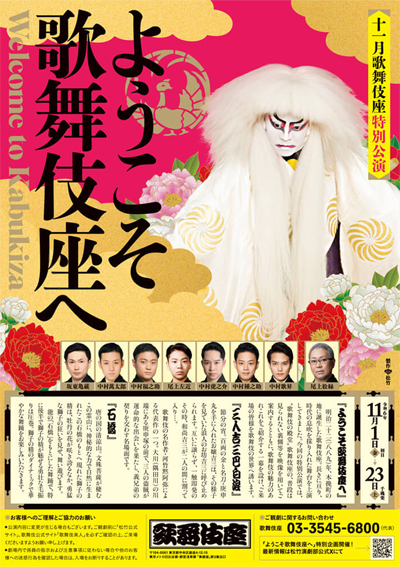 |
| Meijiza (T˘ky˘) |  |
| Dates | 2 ~ 26 November 2024 Meijiza Jűichigatsu Hanagata Kabuki Meijiza November Young Actors Kabuki |
| MatinÚe | |
| Evening | |
| Casting |
Nakamura Kankur˘, Nakamura Shichinosuke, Band˘ Rakuzen, Band˘ Hikosabur˘, Ichikawa Omez˘, Band˘ Minosuke, Band˘ Kamez˘, Nakamura Tsurumatsu, Nakamura Yonekichi, Nakamura Hashinosuke, Nakamura Kamenoj˘, Band˘ Kamesabur˘, Nakamura Baika, Kitamura Rokur˘ |
| Comments |
A special program in T˘ky˘ at the Meijiza.
|
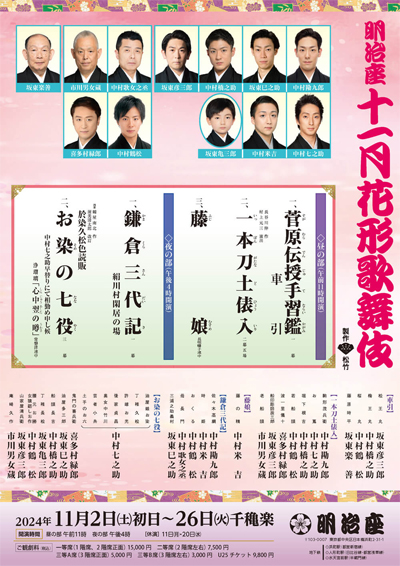 |
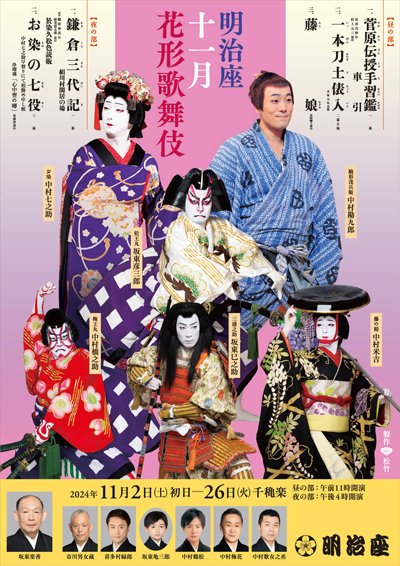 |
| Shinbashi Enbuj˘ (T˘ky˘) |  |
| Dates | 30 November ~ 26 December 2024 Kabuki NEXT |
| Program | |
| Casting |
Matsumoto K˘shir˘, Onoe Matsuya, Nakamura Tokiz˘, Onoe Ukon, Ichikawa Somegor˘, Band˘ Yajűr˘, Kataoka Kamez˘, Ichikawa En'ya, ďtani Hirotar˘, Sawamura S˘nosuke |
| Comments |
A brand new genre was born in the Kabuki world in 2015: After Kabuki, Shinkabuki, SűpÔ Kabuki, SűpÔ Kabuki II and Roppongi Kabuki (Sci-Fi Kabuki), we got Kabuki NEXT. The first Kabuki NEXT drama was "Aterui", which was written by Nakajima Kazuki for Ichikawa Somegor˘ VII. It was staged for the first time in August 2002 at the Shinbashi Enbuj˘, starring Ichikawa Somegor˘ with a non-Kabuki cast. In 2002, it was not a Kabuki or a Kabuki NEXT production. In 2015, it was revised to become the first Kabuki NEXT drama in Kabuki history, with a full Kabuki cast. It was staged in July 2015 at the Shinbashi Enbuj˘ and in October 2015 at the Sh˘chikuza. The second Kabuki NEXT drama, "Oboro no Mori-ni Sumu Oni" is also written by Nakajima Kazuki and it is directed by Inoue Hidenori.
|
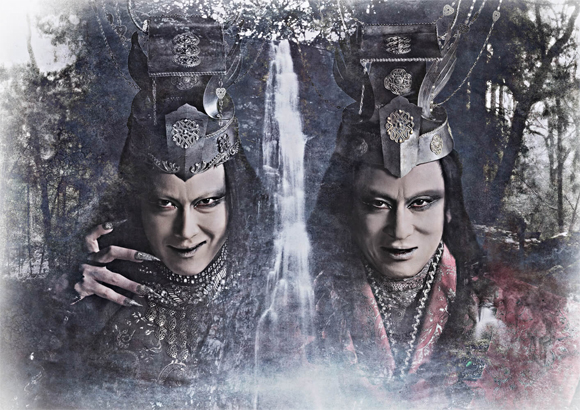 |
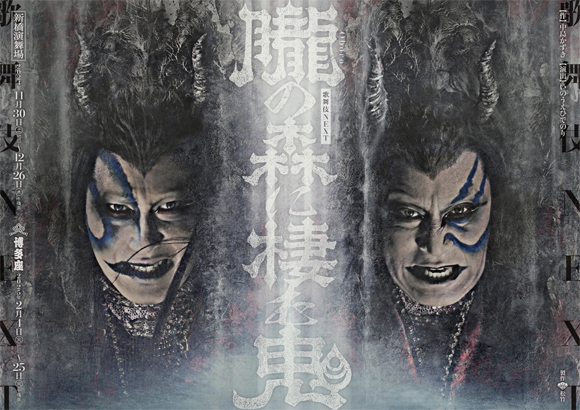 |
| Eirakukan (Toyooka) |  |
| Dates | 4 ~ 11 September 2024 Eirakukan Kabuki Eirakukan Kabuki |
| Program | |
| Casting |
Kataoka Ainosuke, Nakamura Kazutar˘, Kataoka Takatar˘, Ichikawa Kudanji, Nakamura Utanosuke, Kataoka Senju |
| Comments |
14th Kabuki program at the Eirakukan, a renovated traditional theater built in the city of Toyooka (prefecture of Hy˘go).
|
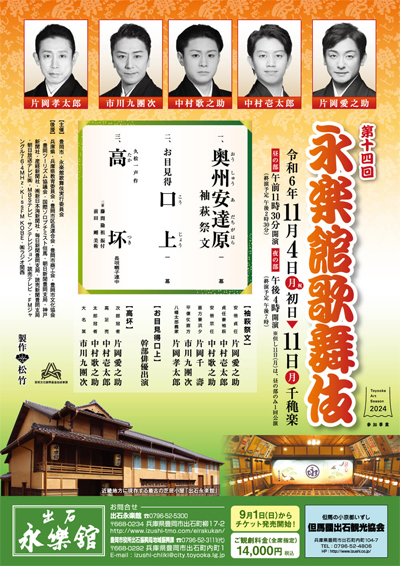 |
| Sh˘chiku Grand Kabuki Tour | |
| Dates | 31 October ~ 25 November 2024 Sh˘chiku ďkabuki Sh˘chiku Grand Kabuki |
| Program |
Goaisatsu |
| Casting |
Nakamura Kinnosuke, Nakamura Hayato, Kamimura Kichiya, Ichikawa Emisabur˘, Ichikawa Seiko, Kamimura Kichitar˘, Kamimura Orinosuke |
| Comments |
The Sh˘chiku Grand Kabuki Fall Tour in 20 cities.
|
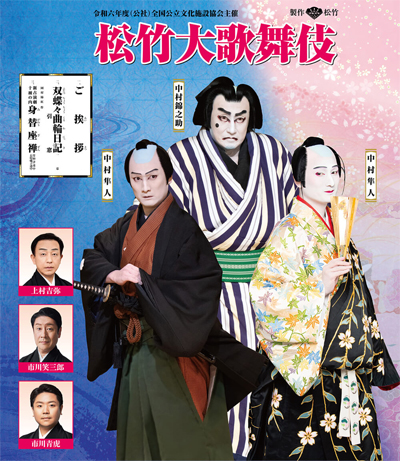 |
| Tachikawa Stage Garden (Tachikawa) | |
| Dates | 21 ~ 24 November 2024 Tachikawa Tachihi Kabuki Tokubetsu K˘en Tachikawa Tachihi Kabuki Special Performances |
| Program |
K˘j˘ | Kaisetsu Shinban Gosho no Goroz˘ Tamamo-no-Mae Tachihi no Nishikie |
| Casting |
Kataoka Ainosuke, Nakamura Kazutar˘, Ichikawa Chűsha, Ichikawa Emiya, Ichikawa Kudanji, Nakamura Tsurumatsu, ďtani Hirotar˘, Nakamura Utanosuke |
| Comments |
A special Kabuki program staged in Tachikawa at the Tachikawa Stage Garden to celebrate the coming 100th anniversary of the creation of the Tachihi Group. |
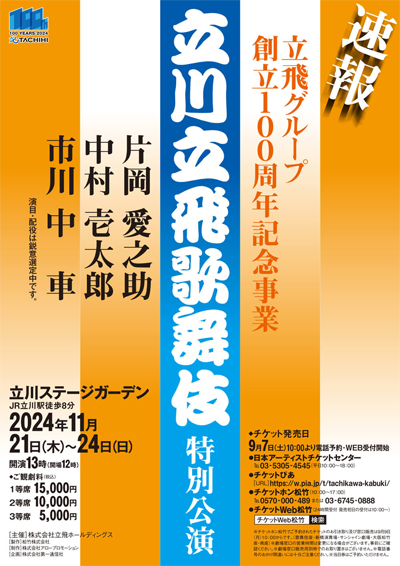 |
 |
| Zenshinza Tour | |
| Dates | 10 November ~ 20 December 2024 |
| Program | |
| Casting |
Fujikawa Yanosuke, Yamazaki Tatsusabur˘, Tamaura Yűnosuke, Hayase Einoj˘, Matsunami Kihachir˘, Arashi Ichitar˘, Watarai Motoyuki, Ishijima Ryűsei |
| Comments |
A long tour for the Zenshinza troupe:
|
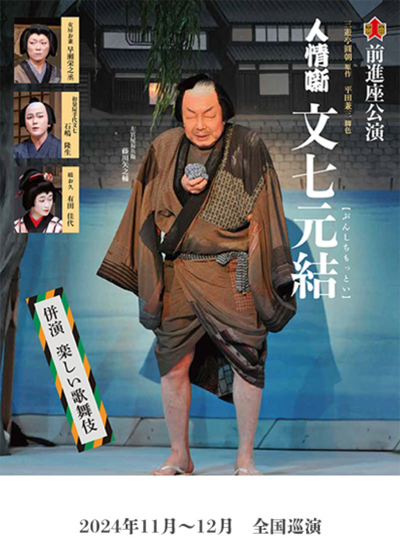 |
|
|
| Contact | Main | Top | Updates | Actors | Plays | Playwrights | Programs | Links | FAQ | Glossary | Chronology | Illustrations | Prints | Characters | Derivatives | Theaters | Coming soon | News |